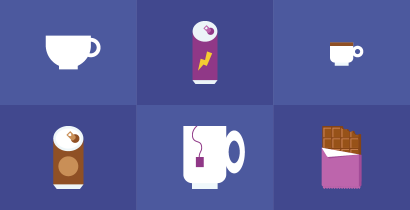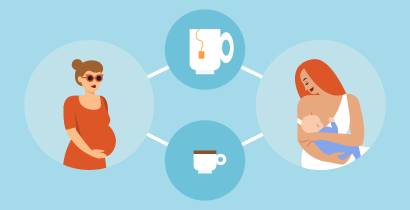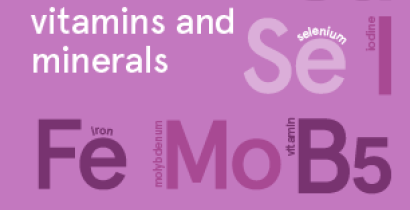7 Myths and Facts about Caffeine
Last Updated : 01 September 2002Caffeine is a naturally occurring substance (an alkaloid) found in the leaves, seeds and fruits of more than 63 plant species worldwide. Products containing caffeine including tea, coffee and some soft drinks, have been enjoyed all over the world for many years. More recently, drinks with higher levels of caffeine, ("energy drinks") have been developed.
One of the most well-known effects of caffeine is its ability to act as a stimulant to temporarily delay fatigue, an effect that can cause insomnia in susceptible people. Caffeine has also been shown to act as a mild diuretic (causing the body to lose water). Despite extensive studies into its safety, there are still many misconceptions about this common food component. This article outlines the science behind caffeine and health and seeks to clarify some of the controversy surrounding this food ingredient.
MYTH: Caffeine's effects are addictive
FACT: People often say they are "addicted" to caffeine in much the same way they say they are "addicted" to shopping, working or television. Caffeine is not addictive by accepted definitions and according to most authorities. When regular caffeine consumption is abruptly ceased, some individuals may experience headache, fatigue or drowsiness. These symptoms usually last only a day or so, and can be avoided if caffeine intake is reduced gradually.
MYTH: Caffeine increases the risk of heart disease
FACT: Large-scale studies have shown that caffeine consumption does not increase the risk of cardiovascular disease and does not raise cholesterol levels or cause irregular heartbeat. A slight, temporary rise in blood pressure has been observed with caffeine consumption with individual who are sensitive to caffeine. However, this rise is similar to that resulting from normal activity, such as climbing stairs. Still, people with high blood pressure are wise to consult their physician about caffeine intake.
MYTH: Caffeine causes cancer
FACT: Substantial scientific evidence demonstrates that caffeine does not increase cancer risk. Two studies of large numbers of people in Norway and Hawaii and a review of 13 studies involving more than 20,000 subjects found no relationship between regular coffee or tea consumption and cancer risk.
MYTH: Caffeine is a risk factor for osteoporosis
FACT: Some studies suggest that caffeine intake may increase calcium loss in the urine. However, any loss has been found to be minimal and caffeine intake at normal levels does not appear to affect calcium balance or bone density. More recent studies have confirmed that caffeine intake is not a risk factor for osteoporosis, particularly in women who consume adequate calcium.
MYTH: Pregnant women or those trying to get pregnant should avoid caffeine
FACT: A large number of studies have looked at the effects of caffeine-containing beverages on reproductive factors. The data suggests that moderate caffeine consumption is safe for a pregnant woman and her unborn child. Results from studies into caffeine intake and time taken to conceive have provided no solid evidence that consumption of caffeine containing beverages may reduce the likelihood of a woman conceiving. Two major studies in the U.S. found no correlation between caffeine consumption and pregnancy outcome or birth defects.
In addition, recent studies have found no correlation between caffeine intake and spontaneous abortion or abnormal foetal growth. However, questions remain about the effects of high doses of caffeine and it is wise for pregnant women to practice moderation (300mg per day or 3-4 cups of instant coffee).
MYTH: Caffeine adversely affects the health of children
FACT: Children generally have the same ability to process caffeine as adults. Studies have shown that foods and drinks containing caffeine when taken in moderate amounts have no detectable effects on hyperactivity or attention span of children. However, in sensitive children, high doses of caffeine, may cause temporary effects such as excitability, irritability or anxiety.
MYTH: There are no positive effects of caffeine
FACT: Caffeine is well recognised as increasing both alertness levels and attention spans. A cup of coffee or tea is often recommended to counter sleepiness, especially for those driving long distances and many people resort to an afternoon "cuppa" to get back on top of their workload. Studies have shown that caffeine may also improve memory and logical reasoning.
Many caffeine-containing beverages, most notably tea and more recently coffee and chocolate, have been found to contain antioxidants. Antioxidants appear to have health benefits especially in the area of heart health and cancer prevention.
Recent reports suggest that caffeine may be useful in treating allergic reactions due to its ability to reduce the concentration of histamines, the substances that cause the body to respond to an allergy-causing substance. More research is need in this area before conclusions can be drawn however.
Caffeine has long been known to help some people suffering from asthma.
The bottom line
After decades of research, the scientific community has not documented any firm association between moderate caffeine consumption and any health risk. Using common sense and moderation, the average person can continue to enjoy tea, coffee and caffeine-containing drinks.
What is a "moderate" intake of caffeine
A moderate intake of caffeine for an adult is about 300 mg a day. To help you calculate what this means in terms of servings, here's what some of the most common sources of caffeine contain.
|
|
Average amount per serving |
|
Instant coffee |
75mg per 190ml cup |
|
Brewed coffee |
85mg per 190ml cup |
|
Brewed tea |
50mg per 190 ml cup |
|
Energy drinks |
28-87mg per 250ml glass |
|
Cola drinks (diet or regular) |
8- 53 mg per 250 ml glass |
|
Some soft drinks |
24mg per 250ml glass |
|
Chocolate |
5.5 - 35.5 mg per 50g bar |
References
- American Cancer Society Medical and Scientific Committee. Guidelines on diet, nutrition and cancer. Cancer J. for Clinicians, 41(6):334-8,1996.
- Lloyd T and Rollings N Dietary caffeine intake and bone status of postmenopausal women. Amer J Clin Nutr.,65:1826, 1997.
- Barone JJ and Roberts H. Caffeine consumption. Food and Chemical Toxicology, 34:119-129,1996 Institute of Food Technologists Expert panel on Food Safety and Nutrition. Caffeine, a scientific status summary, 1987.
- Hinds, TS et al. The Effect of Caffeine on Pregnancy Outcome Variables. Nutr. Reviews, 54(7);203-207, July 1996. MAFF 1999. Caffeine in soft drinks. Food Safety Information Bulletin Services, No 109, p.13



